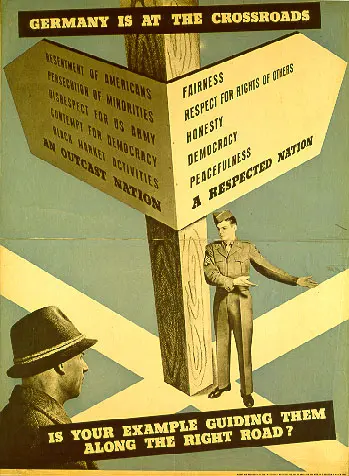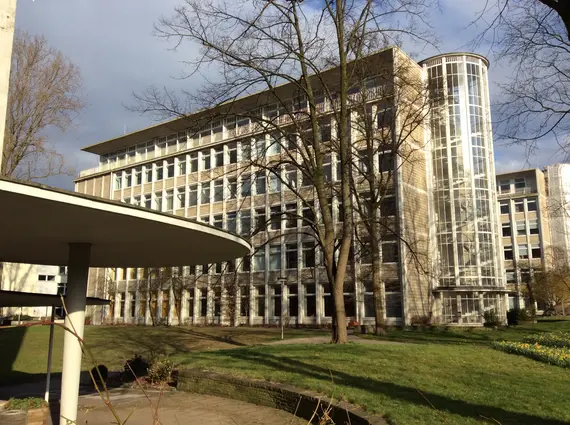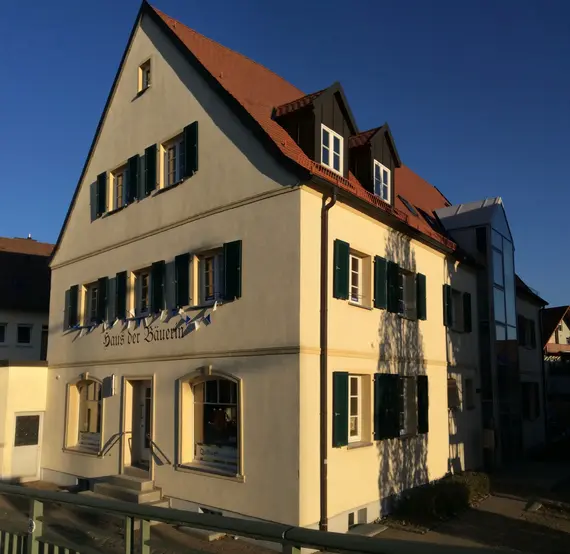Architecture and Democratization in Postwar Germany
Architecture and Democratization: Overlooked witnesses to Allied intervention in occupied Germany after 1945

International conference on Zoom
NEW DATES: 3-5 June 2021
In 2019 and 2020, Germany marks 70 years since its post-war division into East and West and 30 years since reunification. Both anniversaries offer renewed occasion to examine the processes that led to the creation of the two German states in 1949, together with the premises on which they were founded and which seemed vindicated in 1990: premises such as the inevitability of democracy, the value of internationalism, and the possibility of a peaceful and stable world order. Given the current questioning of these ideas not only here but throughout Europe and beyond, such a re-examination seems relevant now in a way that it has rarely been before.
Architecture, too, must be part of this discussion. Taking seriously the notion that "Democracy must be made visible if it is to be understood and embraced" (Michael Dreyer), the first goal of the conference will be to call attention to forgotten or neglected artefacts of Western and Soviet cultural-political intervention in Germany's built environment, with a view to creating a broader as well as a more detailed picture of this activity.
TO THE FOLLOW-ON PROJECT Buildings of the Allied Occupation in Western Germany (1945-1955): The heritage of democratization in Germany's built landscape (funded by the German Research Foundation DFG)
Organization
PD Dr. Johanna Blokker
Chair in Heritage Sciences
University of Bamberg
Am Zwinger 4, Room 00.25
96047 Bamberg
E-mail: johanna.blokker(at)uni-bamberg.de
Tel: +49 (0) 951 863 2343


Architecture as a Medium of American Cultural Diplomacy in Germany between the Second World War and the Cold War
Habilitation project, completed January 2019
Awarded the Bamberg University Habilitation Prize for 2019(2.0 MB)
The project takes as its focus American support for and participation in building projects in post-war Germany that had as their goal the development of a democratic way of thinking and the recasting of the former enemy into an ally of the West and a bulwark against the spread of communism from the Soviet-controlled East. The study centres on the "Special Projects Program" (SPP) of the American High Commissioner for Germany, which provided funds for more than 400 building and reconstruction projects in all three Western occupation zones between 1949 and 1952. Support was given to German initiatives that showed commitment to the cultural integration of Germany into the European community of nations and thus to the promotion of American geopolitical interests in the region. According to its authors, the aim of this so-called "Cultural Marshall Plan" was nothing less than the creation of a "new intellectual and social climate" in Germany.
Some of the sponsored projects, such as the American Memorial Library (Amerika-Gedenkbibliothek) in Berlin or the Hochschule für Gestaltung in Ulm, remain prominent landmarks in the urban and memory landscapes of their respective locations today. The handful of historic monuments that, like the Goethehaus in Frankfurt a.M., were seen as embodying the spirit of the "Other Germany" and were granted funding to rebuild for this reason, are likewise highly visible and enjoy a regular stream of interested visitors. Over time, however, the origins of even these well-known buildings has largely been forgotten; meanwhile, the vast majority of the projects funded by the SPP have completely disappeared from the consciousness of both the public and the scientific community. A central concern of the research effort was therefore to make this corpus of buildings visible again and to revive awareness of its cultural, social and historical significance. In so doing, it has been possible to reveal previously unknown dimensions of German-American relations and to make an original and important contribution to the early history of the Federal Republic of Germany.
Publications associated with the project
Johanna Blokker, "Architektur als Medium US-amerikanischer Kulturdiplomatie in Deutschland nach 1945: Die Dominikanerkirche in Bamberg", in: Bamberg: Militär und Stadt, ed. Gabriele Wiesemann and Sabine Freitag (Petersberg: Michael Imhof Verlag, 2019), pp. 135-163.
Johanna Blokker, "Was nach dem Kalten Krieg übrig bleibt. Umnutzung und Umdeutung der gebauten Hinterlassenschaften der amerikanischen Präsenz in Deutschland", in: Strukturwandel – Denkmalwandel. Umbau, Umnutzung, Umdeutung. Veröffentlichungen des AKTLD 25, ed. Birgit Franz and Ingrid Scheurmann (Holzminden, 2016), pp. 114-121.
Johanna Blokker, "Habilitation Project: Architecture as a Medium of American Cultural Diplomacy in Germany Between the Second World War and the Cold War", in: Forschende Frauen in Bamberg. Beiträge Bamberger Nachwuchswissenschaftlerinnen 8, ed. Ada Raev, Iris Herrmann and Brigitte Eierle (University of Bamberg Press, 2016), pp. 47-61.
Johanna Blokker, "From the Heritage of the German "Other" to the Heritage of the "Other" Germany: American policy on German architectural heritage between the Second World War and the Cold War, in: Das Erbe der Anderen. Denkmalpflegerisches Handeln im Zeichen der Globalisierung, ed. Gerhard Vinken and Carmen Enss (University of Bamberg Press, 2015), pp. 49-57.
Public lectures on the research topic
"Bauliches Erbe in der Besatzungspolitik der Westalliierten in Deutschland nach 1945", Faculty of Humanities and Cultural Sciences, Bamberg University, 2019
"The Special Projects Program of the American High Commissioner for Germany", Urban Renewal and Resilience: Cities in Comparative Perspective, European Association of Urban Historians (EAUH) 14th International Conference, Rome, 2018
"Konversion und Konservierung: Der Erinnerungswert ehemaliger Militärstützpunkte und die Möglichkeiten seiner Erhaltung und Realisierung", Workshop Ehemalige militärische Liegenschaften im urbanen Raum – Konversion für die Zukunftsstadt?, Bonn International Centre for Conversion (BICC), 2015
"Was nach dem Kalten Krieg übrig bleibt. Umnutzung und Umdeutung der gebauten Hinterlassenschaften der amerikanischen Präsenz in Deutschland nach 1989", Strukturwandel – Denkmalwandel. Umdeutung, Umnutzung, Umbau, Annual Conference of the Working Group on Theory and Education in Heritage Conservation (AKTLD), Bauhaus University, Weimar, 2015
"Germany's Amerika-Häuser: Architecture in the Battle for Hearts and Minds", lecture series Making America, Chair in American Studies, Bamberg University, 2015
"American Cultural Diplomacy and the Rebuilding of Germany after 1945", Edinburgh School of Architecture and Landscape Architecture (ESALA) Research Seminar Series, Edinburgh University, 2014
"Architektur als Medium amerikanischer Kulturdiplomatie in Deutschland nach 1945: Die Dominikanerkirche in Bamberg", Bamberg: Militär und Stadt. Öffentliche Vortragsreihe zur Bamberger Militärgeschichte anlässlich der Konversion, Bamberg University, 2014
Research-led teaching
Seminar Konversion und Konservierung: Ehemalige Militärstützpunkte und die Erhaltung ihrer Erinnerungswerte, summer semester 2020.
Seminar Wiederaufbau nach beiden Weltkriegen in Deutschland und Europa, winter semester 2012-13, 2017-18, 2019-20.
Seminar Denkmalpflege und Politik - Denkmalpflege als Politik, winter semester 2017-18, 2019-20.
Seminar Schöne neue Welt: Internationale Beiträge zum Wiederaufbau in Deutschland nach 1945, winter semester 2014-15.
Seminar Denkmalkulturen International, winter semester 2012-13, sommer semester 2015.
